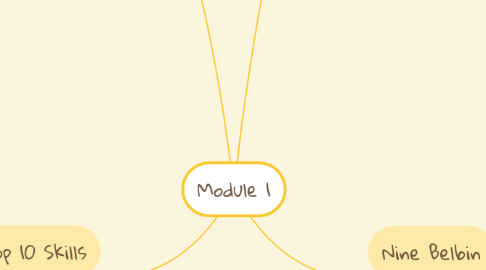
1. Top 10 Skills
1.1. 1. Complex Problem Solving
1.1.1. Being able to solve problems in various situations.
1.2. 2. Critical Thinking
1.2.1. Machines can only extend its power to what its commanded. So people will need to be able to utilize it to different situations.
1.3. 3. Creativity
1.3.1. People who can apply their creativity onto machines and use it to their fullest potential.
1.4. 4. People Management
1.4.1. Being able to delegate jobs effectively.
1.5. 5. Coordinating with others
1.5.1. Interpersonal skills and being able to relate to other people.
1.6. 6. Emotional Intelligence
1.6.1. Being aware of own's impact as well as reading others' emotions well.
1.7. 7. Judgement and decision-making
1.7.1. Being to make decisions at a logical stand point of view.
1.8. 8. Service Orientation
1.8.1. Actively seeking ways to help other people.
1.9. 9. Negotiation Skills
1.9.1. Being able to sell and negotiate arguments.
1.10. 10. Cognitive Flexibility
1.10.1. being able to adjust the way you talk for different types of people. (Adaptation.)
2. Students' viewpoints on TBL
2.1. Advantages
2.2. Promotes active learning
2.3. Can retain knowledge better
2.4. Prepares them for a new type of working environment.
2.5. Challenges
2.6. takes a lot of time to adjust
2.7. students are responsible for their own knowledge
2.8. lecturer will not spoon feed information
2.9. PREPARATION -> IRAT -> TRAT -> APPLICATION EXERCISES
3. Bloom's Taxonomy
3.1. A hierarchy consisting of six cognitive processes that you will face in education. (Essentially saying that knowledge is the basis of everything.)
3.1.1. 1956 Version
3.1.2. Evaluate
3.1.3. Synthesis
3.1.4. Analysis
3.1.5. Application
3.1.6. Comprehension
3.1.7. Knowledge
3.2. 2001 Revised Version
3.2.1. Types of Knowledge
3.2.2. Conceptual
3.2.3. Metacognitive
3.2.4. Procedural
3.2.5. Factual
3.3. Create
3.3.1. Produce new original work
3.4. Evaluate
3.4.1. Justify a stand or decision.
3.5. Analyze
3.5.1. Draw connections among ideas.
3.6. Apply
3.6.1. Use information in new situations.
3.7. Understand
3.7.1. Explain ideas or concepts.
3.8. Remember
3.8.1. Recall facts and basic concepts.

